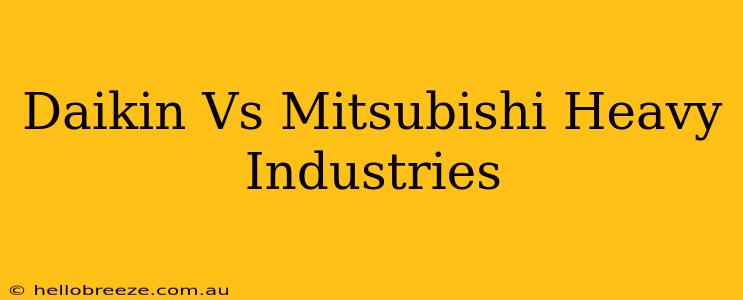Choosing the right air conditioner can feel like navigating a maze. With so many brands vying for your attention, the decision often boils down to comparing top contenders. Today, we're diving headfirst into a comprehensive comparison of two HVAC giants: Daikin vs. Mitsubishi Heavy Industries (MHI). Both are renowned for their high-quality inverter air conditioners, but which one emerges as the victor? Let's explore their strengths and weaknesses to help you make an informed decision.
Key Features & Technologies: A Side-by-Side Comparison
Both Daikin and MHI boast impressive technologies designed for superior cooling and energy efficiency. However, their approaches differ slightly.
Daikin: Innovation & Efficiency
Daikin is celebrated for its consistent innovation. They're known for:
- Advanced Inverter Technology: Daikin's inverters are designed for precise temperature control and remarkable energy savings. Look for features like their Streamlined Inverter technology, which ensures consistent cooling and quieter operation.
- Superior Filtration: Many Daikin models incorporate advanced filtration systems, capturing dust, allergens, and other airborne particles for improved indoor air quality. Features like Flash Streamer technology are noteworthy.
- Smart Home Integration: Daikin frequently integrates smart home functionalities, allowing you to control your AC remotely through smartphone apps. This enhances convenience and allows for energy management.
- Wide Range of Models: Daikin offers a vast array of models, catering to various needs and budgets, from compact units to high-capacity systems.
Mitsubishi Heavy Industries (MHI): Reliability & Durability
MHI is synonymous with reliability and build quality. They prioritize:
- Robust Construction: MHI units are often praised for their robust construction and long lifespan. They are built to withstand harsh conditions and provide years of dependable service.
- Powerful Cooling Performance: MHI units are known for their powerful cooling capabilities, making them an excellent choice for larger spaces or areas with high heat loads.
- Quiet Operation: Many MHI models are engineered for whisper-quiet operation, minimizing noise disruption and creating a peaceful atmosphere.
- Energy Efficiency Focus: While not as flashy with their technology names as Daikin, MHI still maintains a strong emphasis on energy-efficient operation, reducing your energy bills.
Performance & Efficiency: The Deciding Factors
While both brands offer excellent performance, subtle differences might influence your choice.
- Cooling Capacity: Consider the size of the space you need to cool. Both brands offer various capacities, so carefully check BTU ratings to ensure adequate cooling power.
- Energy Efficiency Ratings (SEER/EER): Compare the energy efficiency ratings (SEER and EER) of specific models to identify the most cost-effective option. Higher ratings indicate greater energy savings.
- Noise Levels: If noise is a major concern, prioritize models with lower decibel ratings. Check independent reviews for real-world noise levels.
Price and Value: Finding the Sweet Spot
Generally, both Daikin and MHI air conditioners fall into the premium price range. However, pricing varies considerably depending on the model and features. It's crucial to compare models with similar capacities and features to determine the best value for your investment.
The Verdict: Which Brand is Right for You?
Ultimately, the "better" brand depends on your specific needs and preferences.
- Choose Daikin if: You prioritize cutting-edge technology, smart home integration, advanced filtration systems, and a wide selection of models.
- Choose Mitsubishi Heavy Industries if: You prioritize robust construction, reliable performance, quiet operation, and a focus on long-term durability.
Before making a final decision, we strongly recommend:
- Checking independent reviews: Look at reviews from multiple sources to get a balanced perspective on each brand's performance and reliability.
- Consulting with HVAC professionals: A qualified HVAC technician can assess your specific needs and recommend the best unit for your home or office.
- Comparing detailed specifications: Don't just focus on the brand name – carefully compare the specifications of specific models to ensure they meet your cooling requirements and budget.
By carefully considering these factors, you can choose the air conditioner that provides optimal comfort, efficiency, and long-term value. Whether you opt for Daikin or Mitsubishi Heavy Industries, you're investing in a high-quality product designed to enhance your living environment.

